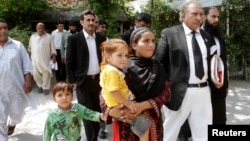A Pakistani court sentenced four men to death Wednesday for the murder of a female relative in what the murderers considered an "honor killing."
The crime was well-documented: The victim, Farzana Iqbal, was beaten to death outside a courthouse where she tried to seek protection from her relatives, who were angered that she had married a man against their wishes.
Her husband tried in vain to get nearby police to intervene.
The revelation that Iqbal's husband had killed his first wife to marry her only added to the case's notoriety.
But what has made Iqbal's case truly remarkable is the sentence, said human rights activists, who noted that the murders of hundreds of women go unpunished every year in Pakistan.
According to the Human Rights Commission of Pakistan, the country's largest independently run rights group, more than 900 women were killed for honor in 2011. The Aurat Foundation, a women's rights group, said more than 3,000 people have been killed for “honor” in Pakistan since 2008.
VOA's Deewa has been following the 2011 case of Shazia, a woman stoned to death in a village near Mardan, in northwestern Khyber Pakhtunkhwa province, and finds it to be far more typical.
Shazia had been married against her will in 2010 and had refused to live with her husband. She was still living with her parents a year later when one of her husband's brothers persuaded her to visit her husband's home in a nearby village.
It was a trap. Not far from Shazia's parents' home, 13 men were waiting for her. The brother-in-law and the men attacked, pelting her with stones until she was dead.
The brother-in-law justified the action, believing Shazia had "breached the family's honor" by refusing to live with her husband.
Killings 'forgiven'
Under family, tribal and clan traditions prevalent in Pakistan and other Muslim countries, a woman is blamed for "compromising family honor" if she marries for love, is suspected of having sex outside marriage, or otherwise breaks with tradition. A women thus condemned faces death, often at the hands of family members, who can then, under those same traditions, be "forgiven" by another relative for the crime.
There has been no forgiveness by Shazia's family. Her father, Zareen Taj, a farmer in his 60s, sought justice in the crowded High Court in Peshawar. That's where lawyer Khyal Muhammad Momand saw him in the halls.
"He looked tired and frustrated, with his eyes full of tears," Momand recalled of their first meeting two years ago. Momand took the case pro bono. There were successes and setbacks.
They managed to bring the case to trial last year. But four suspects, including Shazia's husband, were acquitted for lack of evidence.
The court has also issued an arrest warrant for the main suspect, the brother-in-law, but police have yet to carry it out.
Pakistan criminalized honor killings in 2004, yet as the Aurat Foundation noted, the law is largely ignored and unknown, even by police, outside major cities.
Aurat's Saima Munir told Deewa that "our research in Nowshera [a district in Khyber Pakhtunkhwa] found that despite several honor killings in the past five years, not a single case was registered" under the 2004 law.
Rise in murders feared
In a recent report, the Aurat Foundation blamed honor killings not only on individuals who believe in male supremacy and their right to treat women as property, but on societal norms that pressure families to punish a female relative seen to be breaking with feudal traditions. Researchers are concerned that as women continue to exercise their basic rights, the instances of such murders may increase.
Even in death, the women continue to suffer. Munir said any woman killed in the name of honor is automatically stigmatized in the male-dominated society, and people tend to have placed their sympathies with the murderers.
"Even judges of the courts sympathize with the killers," she said.
Some, but not all. Former judge and legal expert Liaquat Ali told Deewa that "the killers evade the law, because in most of the honor killings, the people involved are family members and they often come to a compromise." Such was the case in the killing of the first wife of Farzana Iqbal's husband, who was "forgiven" by the first wife's son.
The first steps, the Aurat Foundation said, include increased awareness among police and legal authorities that the law backs them up on arresting and prosecuting such killers. The group also recommended using the community to shun the killers, rather than praising them, which would involve a massive campaign promoting human rights. Finally, it called on the media to address the matter head on, as a large number of honor killings simply go unreported.
Media attention appears to have played a role in the case of Farzana Iqbal, though it is just that "sensationalism" the defendants' lawyers say they will use in an appeal.
Shazia's death, like so many others, has remained in the shadows. Or as lawyer Momand said, Shazia's story, like those of other victims, is one "of justice denied."
Deewa's Iftikhar Hussain reported from Washington; Deewa's Sadia Qasim Shah and Riaz Hussain contributed from Pakistan.




